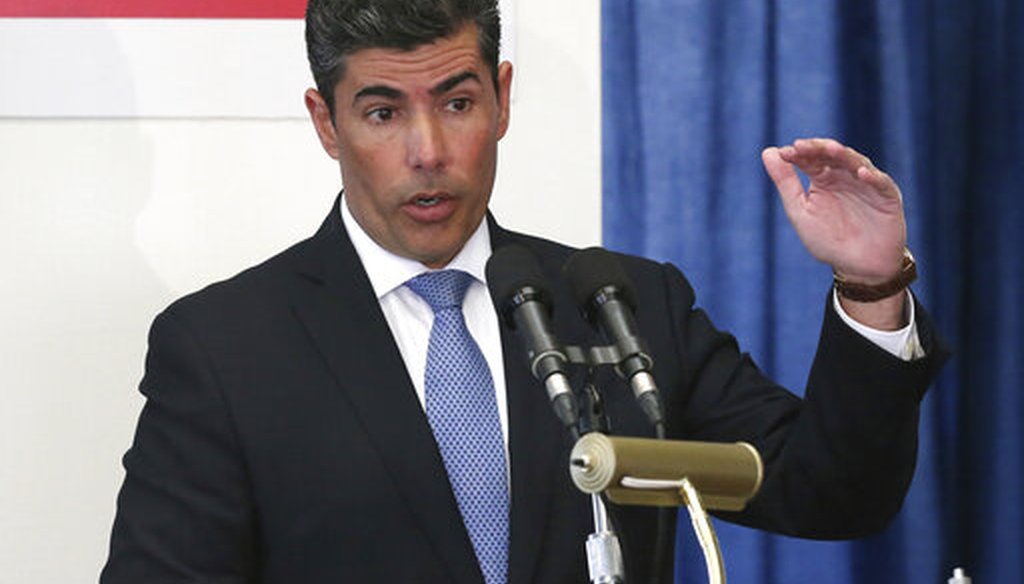Stand up for the facts!
Our only agenda is to publish the truth so you can be an informed participant in democracy.
We need your help.
I would like to contribute

House speaker Jose Oliva, R-Miami Lakes speaks at a pre-legislative news conference, Wednesday, Jan. 30, 2019 in Tallahassee, Fla. (AP)
Is health care the top reason for bankruptcies, as a Florida GOP leader said?
Health care is a top reason that Americans are saddled with debt, said Florida House Speaker José Oliva, R-Miami Lakes.
"The two issues that Floridians and Americans are most controlled by nowadays financially are their health care, No. 1 reason for bankruptcy, and student loans, No. 1 debt for young people," Oliva told reporters during the Associated Press’s legislative day Jan. 30.
Oliva stated that the only way to curb rising health care costs is to allow more competition in the free market. The Republican-led Legislature has rejected Medicaid expansion, which is a part of the Affordable Care Act.
We found that it isn’t so simple to determine if health care is the top reason for Americans to declare bankruptcy.
It’s tough to tease out the single-most factor in bankruptcies, because people can find themselves in debt for multiple reasons at once. But medical bills and illnesses can play a role in bankruptcy, including when people can’t work as a result of their health.
There are a few key studies about the extent to which medical bills and illnesses factor into bankruptcy. Oliva’s spokesman also cited studies about the financial burden of medical debt, but we will focus on the research specifically about bankruptcies.
Research on bankruptcies and medical costs
Medical bankruptcy was a frequent Democratic talking point around the discussion of the Affordable Care Act.
In 2009, President Barack Obama said, "The cost of health care now causes a bankruptcy in America every 30 seconds." Democrats in the Senate, including Hillary Clinton and Chris Dodd, made statements about the percentage of bankruptcies attributed to medical issues.
The research has drawn a lot of attention because key research was co-written by Elizabeth Warren, then of Harvard Law School and now a U.S. senator running for president.
In a 2005 paper, Warren, along with David Himmelstein, then at Harvard Medical School, found that that 28.3 percent of bankruptcies were attributed to illness or injury alone based on 2001 data. But that number grew to 46.2 percent when researchers asked about additional factors such as unpaid medical bills, lost income due to illness, or the mortgage of a home to pay medical bills. The researchers interviewed about 900 people who had filed for bankruptcy and examined bankruptcy records.
They updated their research in a paper in 2009 and found for 62 percent of people, illness or medical bills contributed to their bankruptcy. Researchers designated bankruptcies as medical based on debtors’ stated reasons for filing, income loss due to illness, and the magnitude of their medical debts. (Oliva’s spokesman, Fred Piccolo, included this study among several he sent to PolitiFact but said the 62 percent figure was probably too high.)
The Harvard research has led to years of disagreement between the authors and other academics. Critics of the research have said it relied too much on people saying their medical bills led to their own bankruptcies, rather than independent confirmation. David Dranove and Michael Millenson at the Kellogg School of Management at Northwestern analyzed the data and concluded that there was a causal link in only 17 percent of personal bankruptcies.
"It is insufficient to show that medical problems are associated with bankruptcy; one must also determine whether, and to what extent, medical spending causes bankruptcies," they wrote in 2006.
Himmelstein and Warren pushed back, noting that an industry group supported the research by Dranove and Millenson.
More recent research on the topic renewed the debate.
A group of economists from the University of Southern California, MIT and the Kellogg School wrote an article published in 2018 in the New England Journal of Medicine, "Myth and Measurement: The case of medical bankruptcies."
Using data on California adults from 2003 to 2007, they found that hospitalizations caused only 4 percent of personal bankruptcies among adults. The researchers acknowledged this didn’t cover all potential bankruptcies from illnesses or injuries that did not lead to hospitalization, or from hospitalizations of children or senior citizens.
In an interview with PolitiFact, Himmelstein zeroed in on those caveats, saying that it led to a big underestimate in bankruptcies.
"Families can drown in medical debts without a hospitalization — they may spend hours in an emergency department after an accident, followed by months of physical therapy, or have chronic conditions requiring drugs costing tens of thousands of dollars," Himmelstein and his co-authors wrote in a response to the 2018 study.
Neale Mahoney, a University of Chicago economics professor, said that the research by Warren and her co-authors overstates the share of bankruptcies caused by health shocks. One problem is that those who file for bankruptcy may attribute it to health problems, while downplaying other factors such as financial mismanagement.
On the other hand, the California study understates the impact of health shocks on personal bankruptcy because it only looks at hospital admissions.
"More broadly, I think determining exactly what causes bankruptcy is difficult, because bankruptcy typically has multiple causes — overborrowing, job loss, health shocks, and so on," he said. "That being said, I think Jose Oliva's statement is not outside of the range supported by the research literature."
We interviewed two other professors who said that the 62 percent figure is too high and that the 4 percent figure is probably closer to the truth: Craig Garthwaite, a professor at the Kellogg School of Management at Northwestern and Martin Gaynor, a professor of economics and health policy at Carnegie Mellon University.
"That doesn’t mean that health care expenses don’t cause people financial hardship — they do," Gaynor said. "It just means that (medical issues are) not responsible for nearly as large a percentage of bankruptcies as some people have been claiming."
Our ruling
Oliva said that health care is the "No. 1 reason for bankruptcy."
Research in 2009 found that in 62 percent of cases, medical illnesses or bills contributed to bankruptcy, based on surveys of the people who declared bankruptcy.
But other academics have disagreed with that conclusion, particularly those who are wary that people tend to blame financial problems on illness when there are other reasons as well.
A paper published in 2018 concluded that adult hospitalizations caused 4 percent of personal bankruptcies, but that data also has limitations.
It is difficult to pinpoint a top reason for bankruptcies because multiple factors could collide, causing someone’s debt to mount and leading to bankruptcy. Researchers are still debating how different issues contribute.
We rate this claim Half True.
Our Sources
Health Affairs, Discounting The Debtors Will Not Make Medical Bankruptcy Disappear, March/April 2006
American Journal of Medicine, Medical Bankruptcy in the United States, 2007: Results of a National Study, 2009
New England Journal of Medicine, Myth and Measurement — The Case of Medical bankruptcies and related correspondence, March 2018
Northwestern University economist Matt Notowidigo, co-author of the New England Journal of Medicine article, Twitter thread, June 6, 2018
New York Times, Reviving a Medical Bankruptcy Debate, June 7, 2018
New York Times, Obama’s Remarks at the White House Health Care Forum, March 5, 2019
Washington Post opinions Megan McArdle, The truth about medical bankruptcies, March 26, 2018
CNBC, "Medical Bills Are the Biggest Cause of US Bankruptcies: Study", June 25, 2013
NerdWallet, "NerdWallet Health Finds Medical Bankruptcy Accounts for Majority of Personal Bankruptcies," March 26, 2014
Henry J. Kaiser Family Foundation, The Burden of Medical Debt: Results from the Kaiser Family Foundation/New York Times Medical Bills Survey, Jan. 5, 2016
Tampa Bay Times The Buzz blog, "José Oliva bets the free market will cure Florida’s health care crisis," Jan. 30, 2019
PolitiFact, "Former U.S. Rep. Patrick Kennedy says most bankruptcies in U.S. are due to health care costs," July 29, 2012
PolitiFact.com, "Medical bankruptcy study not so clear-cut," June 11, 2009.
PolitiFact.com, "A broad definition of ‘medical bills,’Sept. 17, 2007
Interview, Fred Piccolo, State Rep. Jose Oliva spokesman, Jan. 30, 2019
Interview, John Hartgen, American Bankruptcy Institute spokesman, Jan. 30, 2019
Interview, Matt Notowidigdo, Northwestern University economist, Jan. 30, 2019
Interview, Neale Mahoney, University of Chicago economics professor, Jan. 31, 2019
Interview, David Himmelstein, School of Urban Public Health at Hunter College professor, Jan. 30, 2019
Interview, Craig Garthwaite, Kellogg School of Management at Northwestern University Research Professor in Hospital and Health Service, Jan. 30, 3019
Interview, Benedic Ippolito, American Enterprise Institute health economist, Jan. 30, 3019
Interview, Martin Gaynor, Carnegie Mellon University professor of economics and health policy, Jan. 30, 2019
Interview, Michael Millenson, Northwestern University’s Feinberg School of Medicine adjunct associate professor, Jan. 30. 2019
Browse the Truth-O-Meter
More by Amy Sherman
Is health care the top reason for bankruptcies, as a Florida GOP leader said?
Support independent fact-checking.
Become a member!
In a world of wild talk and fake news, help us stand up for the facts.
















































